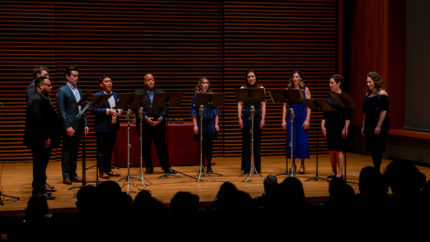Chicago a cappella makes a convincing return to classical rep in “From Behind Closed Doors”

In recent seasons, Chicago a cappella has distinguished itself among Chicago’s saturated landscape of venerable vocal ensembles by playing toward myriad tastes, expanding its repertoire of motets and madrigals to include cabaret and pop numbers.
However, the ensemble’s latest program, “From Behind Closed Doors,” marks a return to traditional classical fare while still centering largely accessible works.
CAC wrapped up a four-concert run of “From Behind Closed Doors” on Sunday afternoon at River Forest’s Grace Lutheran Church. The program, thoughtfully assembled by artistic director John William Trotter, focuses on composers whose music has been, for one reason or another, obscured from widespread public recognition.
In the case of Vittoria Aleotti, a life of service as an Augustine nun may have been the cause for her belated recognition. Her lovely, lilting “Hor Che la Vaga Aurora” opened the program, one of three motets the Chicago a cappella singers handily dispatched in an assertion of the group’s Renaissance-era bona fides.
Baritone Matthew Brennan, in introducing selections from William Byrd’s Requiem, noted that the composer’s devout Catholicism would have made him a target for arrest in Protestant-dominated, 16th-century England.
Thus, Brennan’s cheeky assessment of this music “transcendently beautiful and potentially dangerous,” is nonetheless an apt one. Byrd may be meat and potatoes for choral singers, so his expansive works are a fair litmus test for their chops. The ensemble brought thoughtful balance and pacing to the Credo, though these displays were undercut by clumsy entrances and pitchiness among the inner voices, an issue fitfully recurrent in other works as well . The Sanctus and Agnus Dei, by contrast, were marked by skillful canonical interplay and clean, unstrained cadences.
Born some 350 years after Byrd, Herbert Howells is a much-later successor of the English polyphonic tradition. The Chicago a cappella singers split into a double-choir arrangement to tackle Howell’s layered, antiphonal counterpoint. The music itself is rich-hued and bracing, but the divisi configuration rendered the ensemble’s sound thin. The singers preserved the clarity of Howells’ score, but such clarity was a dual-edged sword, as the transparency again revealed touchy intonation between the ensemble’s tenors and mezzos.
Two works by Sulpitia Cesis, O Crux Splendidor and Stabat Mater, fared better. Reunifying into a single chorus restored the ensemble to full power for the Stabat Mater, as well as another excerpt from Howells’ Requiem, “I Heard a Voice From Heaven.” The performances were lifted by the soloist Ryan Cox, whose oaky baritone lent a solid backbone to Howell’s lush, borderline jazzy setting.
The program’s latter half was dedicated to the work of women composers, beginning with Aleotti’s “O Quante Volte in Van Cor Mior.” Among these works, top billing was given to the winners of the HerVoice competition, a program inaugurated by Chicago a cappella to spotlight the works of and provide mentorship to emerging women composers.
The first was a setting of Alfred Lord Tennyson’s “Lullaby” by Inna Onofrei. It’s easy to see how the work would be favored: the cool, consonant harmonies and songlike refrain appeals to pop sensibilities and art-music purists. The setting by the Cleveland-based, Armenian-American composer fits pleasingly into the contours of Tennyson’s verse, underscoring the text’s oscillating rhythm and upholstering it in a moody sonority.
Next was Invitation to Love by Brittney Benton, who introduced her own work as a lullaby sung by a lover to “a partner they haven’t met yet.” The ensemble gave a committed reading of the young composer’s score, which is marked with consonant clusters and an occasionally precious approach to the text. The talents of composer and performer alike soared in the melismatic final stanzas, as timeless as an extended “Amen.”
Sarai Hillman’s Peace, a Chicago a cappella commission, arranges a sonically colorful bouquet around comparatively plainspoken biblical text. The work proved a highlight for Hillman’s innovative treatment of the text and approach to vocal orchestration; a standout moment finds the low voices reciting on obbligato on the words “surpass my understanding” while the women layer upon increasingly florid exhortations of peace.
The music of Florence Price is ubiquitous of late, yet her Resignation was an essential addition to the triptych of works by black women, alongside the works of Benton and Hillman. The song’s text (also by Price) and music extend a tradition of African-American spirituals with earthy harmonies and tightly controlled counterpoint. The singers gave an emotive reading that steered clear of glibly bluesy affectation, even if the sopranos’ warbly delivery diluted the overall solemnity.
In What Lips My Lips Have Kissed by Chicagoan Stacy Garrop, the ensemble touted a different kind of virtuosity, traversing craggy, chromatic harmony and sweeping contrasts from hushed incantation and stentorian declamation. Hardly during this program did the group’s voices cohere so seamlessly, and to such great effect, as in the wordless strains of the work’s hauntingly understated conclusion.
Following Aleotti’s Io V’amo Vita Mia, the Chicago a cappella singers offered by way of benediction, Margaret Bonds’ “I shall pass through this world” as a solemn missive on words by Stephen Grellet: “Any good therefore that I can do or any kindness that I can show to any human being, let me do it now.”
Chicago a cappella’s season continues in April with performances in Chicago, Evanston, Naperville and Oak Park. chicagoacappella.org
Posted in Performances

